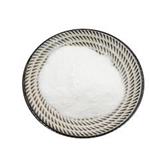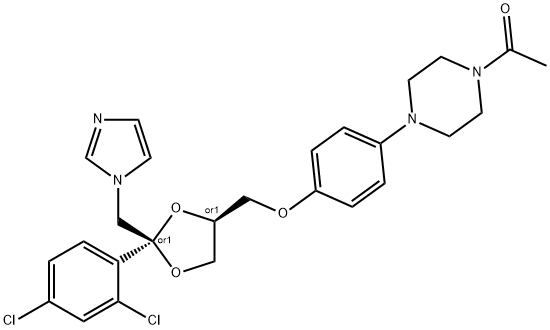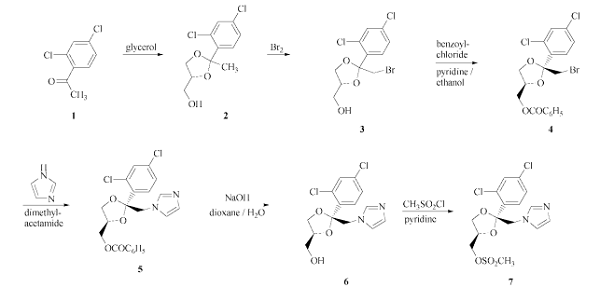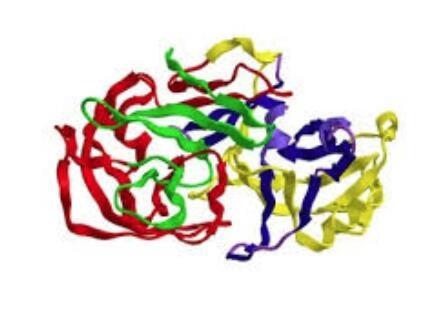Safety of Ketoconazole
General description
Ketoconazole is an imidazole fungicidal agent with a very broad spectrum of activity against many fungal species that is used for treatment of superficial and systemic fungal infections. Ketoconazole is a well documented cause of clinically apparent acute drug induced liver injury and is no longer recommended as a first line antifungal agent. (2R,4S)-ketoconazole is a cis-1-acetyl-4-(4-{[2-(2,4-dichlorophenyl)-2-(1H-imidazol-1-ylmethyl)-1,3-dioxolan-4-yl]methoxy}phenyl)piperazine which dioxolane moiety has (2R,4S)-configuration. It is an enantiomer of a (2S,4R)-ketoconazole. Broad spectrum antifungal agent used for long periods at high doses, especially in immunosuppressed patients.
Figure 1 the chemical structure of Ketoconazole
Application and Pharmacology
Topical ketoconazole for the treatment of androgenetic alopecia: Androgenetic alopecia (AGA) is common and associated with significant psychosocial distress. Treatment options are needed for patients that do not adequately respond to first line treatments of finasteride or minoxidil. Topical ketoconazole has been proposed as a promising treatment. Evaluate the efficacy of topical ketoconazole in the treatment of AGA. Murine studies demonstrated a significant increase in mean ratio of hair regrowth to denuded area in the ketoconazole treatment groups compared to controls. Human studies reported increased hair shaft diameter following ketoconazole use. One study reported a significant increase in pilary index (percent anagen phase × diameter) following treatment. Studies also demonstrated clinical improvement of AGA based on photographic assessment and subjective evaluation. Topical ketoconazole is a promising adjunctive or alternative therapy in the treatment of AGA. Randomized controlled trials are needed. Recent studies have supported the efficacy of topical ketoconazole for AGA. Ketoconazole is an imidazole derivative and potent antifungal agent that inhibits ergosterol synthesis. Ketoconazole is thought to exert anti-inflammatory effects through inhibition of 5-lipooxygenase. In addition, ketoconazole blocks testosterone synthesis, thus decreasing DHT, and further supporting the theoretical role of ketoconazole in the treatment of AGA[1].
Synthesis
Antifungal drug ketoconazole was synthesized by utilization of phase-transfer catalysis from [2-bromomethyl-2-(2,4-dichlorophenyl)-1,3-dioxolan-4-yl]methanol via acylation, N-alkylation with imidazole and hydrolysis, formation the active ester with methanesulfonyl chloride, and then condensation with the side chain 1-acetyl-4-(4-hydroxyphenyl)piperazine. The overall yield was about 30%.
Safety
Ketoconazole-Associated Liver Injury in Drug-Drug Interaction Studies: Ketoconazole is a potent CYP3A inhibitor in vivo, and frequently serves as an index CYP3A inhibitor in drug-drug interaction (DDI) studies with healthy volunteers. Limitations restricting the use of systemic ketoconazole in such studies have been recently imposed by regulatory agencies in the United States, the European Union, and elsewhere. A risk of ketoconazole-associated liver injury in the context of DDI studies was cited as the primary justification for these measures. To evaluate the basis for these restrictions, we analyzed a series of published DDI studies identified from a review of existing literature. The study set consisted of 53 DDI studies, and included 971 healthy volunteers with systemic ketoconazole exposure in addition to the victim drug under study. Ketoconazole-associated abnormalities in serum chemistry values indicative of liver injury were observed in 4 subjects, representing a prevalence of 0.41% within the study population. There were no major adverse reactions or instances of hepatic failure. All abnormalities indicative of liver injury resolved upon discontinuation of ketoconazole treatment. The findings from this review do not support restriction of ketoconazole as an index CYP3A inhibitor in DDI studies involving healthy volunteers[2].
This medicine should be used only when you cannot use other antifungal medications. Ketoconazole can cause serious harm to your liver that may result in liver transplant or cause death. Call your doctor at once if you have any signs of liver damage, such as nausea, vomiting, stomach pain, fever, tiredness, loss of appetite, dark urine, clay-colored stools, or jaundice (yellowing of the skin or eyes). Tell your doctor about all your current medicines and any you start or stop using. Many drugs can interact, and some drugs should not be used together. Ketoconazole can also cause a serious heart problem. Call your doctor right away if you have fast or pounding heartbeats, shortness of breath, and sudden dizziness.
Reference
1.Fields J. R., Vonu P. M. & Monir R. L. et al., "Topical ketoconazole for the treatment of androgenetic alopecia: A systematic review," Dermatologic therapy, Vol.33, No.1(2020), p.e13202.
2.Banankhah P. S., Garnick K. A. & Greenblatt D. J., "Ketoconazole-Associated Liver Injury in Drug-Drug Interaction Studies in Healthy Volunteers," J Clin Pharmacol, Vol.56, No.10(2016), pp.1196-1202.
);You may like
Related articles And Qustion
Lastest Price from Ketoconazole manufacturers

US $1.00/g2024-04-29
- CAS:
- 65277-42-1
- Min. Order:
- 1g
- Purity:
- 0.98
- Supply Ability:
- 1000

US $180.00-55.00/Kg/Bag2024-04-28
- CAS:
- 65277-42-1
- Min. Order:
- 1Kg/Bag
- Purity:
- USP / Medicine grade / UN2811 Class 6.1, PGIII
- Supply Ability:
- 20 tons


